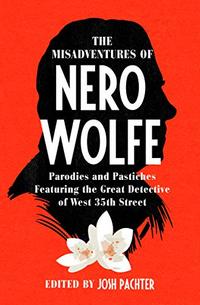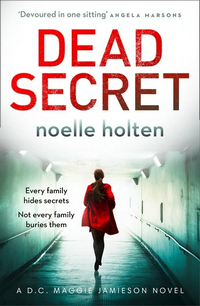 |
Dead Secretby Noelle Holten Kindle Edition, 448 pg. Read: April 23-26, 2021 |

Before I dive in, I’d fully intended on having this posted five days ago, but I had to keep trashing paragraphs because I’d wander into a spoiler or three, and by the time I’d sanitized them enough to post, they were worthless. This has resulted in a shorter post than I expected, and one that may not feel up to my typical thoroughness for this series. There’s a lot to chew on in this novel—more than anything since Dead Inside—but this isn’t the place to talk about it.
The team were deflated – long nights, no solid leads – morale down – they needed to catch a break.
While they waited for more information, Maggie spent the majority of her day chasing up the curfew company, cross-referencing the prison tattoos – which was proving to be a very tedious job – and chasing up Social Care.
While waiting on hold, she recalled a conversation she’d had with her brother about how funny she found it that a large majority of the public believed that everything in a murder investigation was so exciting and moved quickly because of the way that it was portrayed in movies and TV – however a big part of her job focused on calls, computer work, research, and reports. She wished it was the opposite!
What’s Dead Secret About?
The book opens in the final fleeting moments of a young man’s life, he’s scared, beaten, bloody, and desperate for help. And then he’s no longer scared or desperate again. Found in a woody area near an industrial estate, his face has some dots drawn on it, but aside from that, there are no other clues—assuming they are one.
Maggie and the rest of her team have barely begun to get into this investigation when their DI drops a bomb on them—their DCI has gone missing. It’d been a couple of days since anyone had heard from him, so some officers went to check him—they found no one at the home but did find evidence that a violent crime had been committed there. Given their staffing levels, they couldn’t have some detectives work the missing persons cases and others focus on the homicide, so each detective on the team would be involved in each. Watching the detectives try to balance these cases—which primarily means not dropping everything to focus on DCI Hastings and his family—is good to see, and a needed reminder that actual detectives frequently have to juggle multiple cases at once—unlike their fictional counterparts.
Meanwhile, the domestic abuse shelter that Lucy Sherwood has been trying to start is on the verge of opening. But days before, a “battered and semi-conscious woman in her doorway” led her to get an early start. The young woman doesn’t speak at the beginning and appears to be reading lips when dealing with the paramedics. She won’t interact with the police, however. It is impossible not to feel all kinds of sympathy toward this woman—and Lucy definitely feels that way. This storyline is a fantastic way to follow up on Dead Inside, the first book in the series, and show how far Lucy’s comes since then and why her center is needed.
Realism
One thing that seems to jump out at the reader of this series is how authentic the procedural elements feel. Sure, events and characters are heightened, clearly played for greater narrative tension, and the like. But you can’t avoid how real this world, characters, and situations seem. Like the general public in that quotation above, novel readers are frequently given just “the exciting” portions of the procedural, but here, we see the drudgery, the combing through reports, and endless research before substantial advances in the investigation are made. While showing the reader that research and paperwork characterizes modern policing, Holten still allows her characters to have small maverick streaks that propel the action forward a little faster than the actual procedure can.
Along the same lines, all I know about the British probation system comes from this series and Helen Fitzgerald’s Worst Case Scenario. I think if I did, I’d have a better appreciation for scenes in each of these novels. Lacking that (and the drive to do research), I just have to assume that Holten was paying attention during the almost two decades she worked as a probation officer and is giving us something fairly reality-based.
One Random Thought
There are six times in the novel that “youths” is used, like: “youths in the area”, “gang of youths”, and so on. Maybe it’s a cultural thing, but I couldn’t help but laugh. It was like Maggie had been replaced by Schimdt. It’s not worth mentioning, really. But in a book as grim as this, you take the smiles where you can get them.*
* See also two surprising, but effective, TV references. I don’t remember this series doing that.
Give Her a Break
Several times throughout the novel, Maggie thinks about how tired she is—and how little downtime she’s had between major cases. She didn’t get a lot of time between these cases and the previous books (although she had even less between Books 2 and 3). Maggie needs to catch her breath if she’s going to be any good to anybody. Her personal life is a mess, and I’m worried that her professional life is close it one, too. Her physical and mental reserves have to be beyond spent—and you can’t help but wonder as you read this book (and the previous one) if she wouldn’t have picked up on something sooner if she’d been coming at things with a fresh mind.
It’s not much of a spoiler to say that Maggie isn’t going to get a whole lot of downtime before Book 5’s case takes over her life. But what comes after that? As far as I can tell*, this is intended to be a five-book series—so hopefully Maggie gets to take that holiday she’s been thinking about. Even more hopefully, we get to have at least a few more books with her.
* I’m prepared to be shown that I’m wrong—and hope I am.
So, what did I think about Dead Secret?
I’m a fan of this series—so obviously, I went into this book expecting to like it. But any reader knows that sometimes those expectations aren’t met. Thankfully, it wasn’t long at all before I knew Holten had, once again, provided her readers with a great read.
You’ve got a pretty grizzly beating death to start off with and then you the police’s natural inclination to focus all resources on the missing DCI—and them not necessarily wanting to follow all the evidence that points to the DCI not being the kind of man they all thought. Just those two storylines would be enough. But then Holten throws in that third storyline—here’s a person in desperate need of help, a survivor of (as far as anyone can tell) of domestic violence—a reminder that policing isn’t about arrests, it isn’t about only maintaining social order—it’s about people like this woman who showed at Lucy’s front door, it’s protecting and serving the public. This is the kind of thing that both (fictional and real) civilians and the (fictional and real) police need to be reminded of, and here it elevates the rest of the novel by its presence.
I’d largely figured out who the killer was and how it was happening pretty early on. I wasn’t prepared for the motive behind the killing until it was clear. Holten also did a good job of revealing enough for readers who wanted to identify the killer early while at the same time writing things clearly enough that even people who didn’t want that revelation would be able to enjoy the novel.
This is Holten at her best—I also see this having better commercial appeal than the previous novels in the series and I hope I’m right. Can you read this without having read the previous three novels? Yes. I think you’d be better off starting with the first book, but the important thing is that you start somewhere with this series.

![]()



 Grab a book, any book.
Grab a book, any book.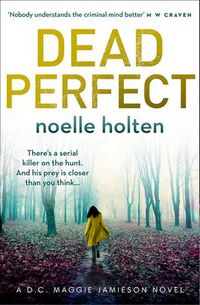

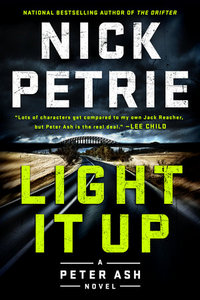
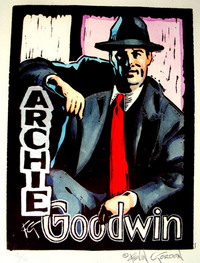
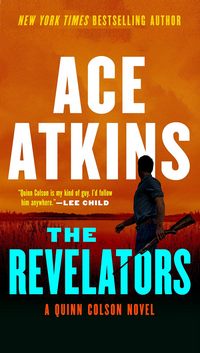



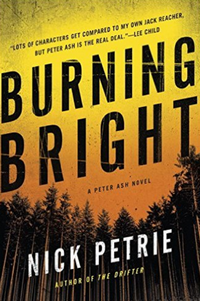
 At multiple points both Peter and June note that Peter’s having fun when it’s dangerous, when things are violent, when the bullets are flying. As a reader, this is great—you don’t see Reacher, Charlie Fox, Evan Smoak, etc. enjoying things quite like this. But I’m a little worried about what it says about him as a person.
At multiple points both Peter and June note that Peter’s having fun when it’s dangerous, when things are violent, when the bullets are flying. As a reader, this is great—you don’t see Reacher, Charlie Fox, Evan Smoak, etc. enjoying things quite like this. But I’m a little worried about what it says about him as a person.
